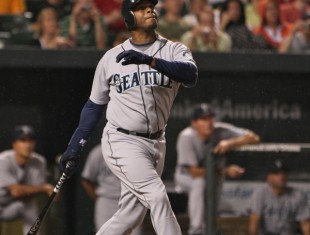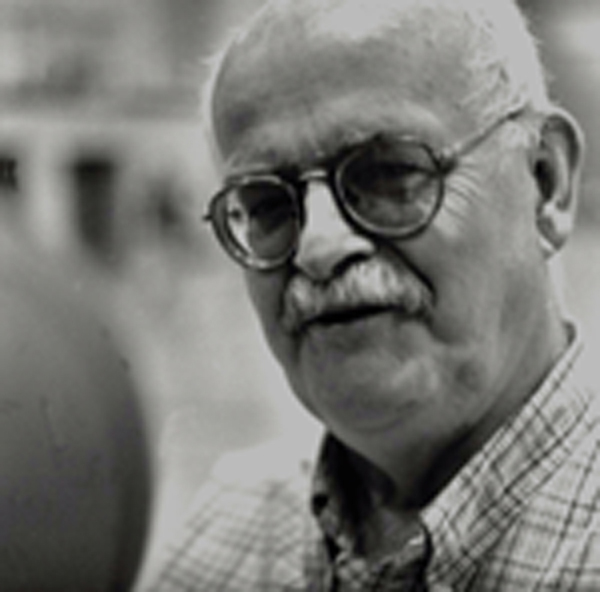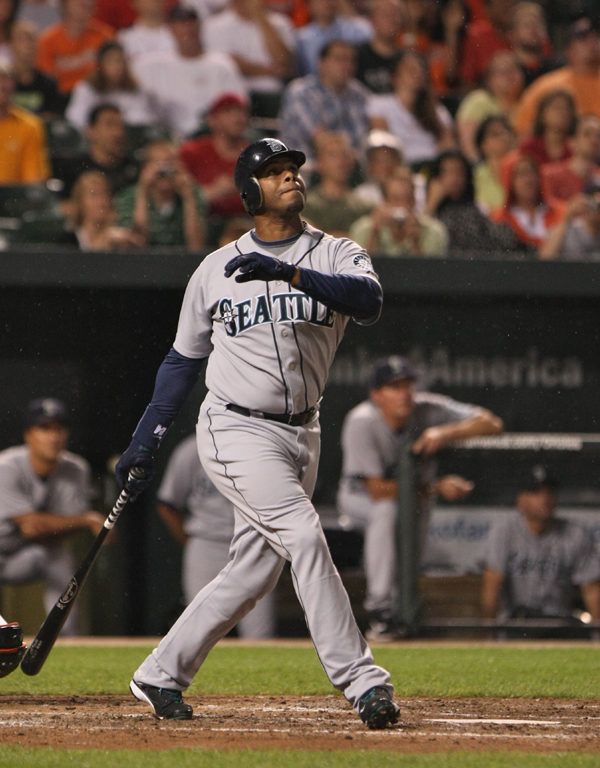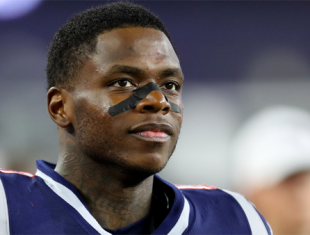TERRY MOSHER
KEN GRIFFEY JR.
I have a flaw in my character (well, I have more than one) that I don’t like to repeat over and over what others are writing, talking about, showing on television or blogging about over and over and over again. When this occurs, as it has this week, I normally retreat and remain silent.
But I’m going to reluctantly push that flaw aside today and write about Ken Griffey Jr., who as you already know and already knew before it happened, that the guy who saved professional baseball in Seattle was elected to the Baseball Hall of Fame Wednesday by the largest percentage margin (99.3 percent of eligible voters) in the history of balloting for election to Cooperstown.
A side issue has risen since the vote and I’m sure it will be talked about for the next decade or so: Who were the three knuckleheads who didn’t vote for Griffey, who got 437 votes out of 440 that were eligible to vote? There is a persistence overriding issue to the Hall of Fame vote that says no player should be elected unanimously, thus insuring the purity of the vote, and I’m guessing these three are upholding that tradition.
That is hogwash, of course. If a player like Griffey, or Ty Cobb, Babe Ruth, Ted Williams or Joe DiMaggio, deserves to be in Cooperstown without question than why shouldn’t it be an unanimously vote? It’s stupid to withhold a vote (and each voter has a maximum of 10 players he or she can vote ford) just to remind everybody that election into the Hall of Fame is, and should be, the most rigorous of all the Hall of Fames.
I can’t wait to see who the three voters were. And with us being in the information age with the advent of all types of social media available, I’m sure they will be revealed. And once they are, it will be very interesting to see their explanations for not voting Griffey among their top 10 choices.
Griffey’s election was one of the easiest ones to predict. He had an incredible 22-year career in the Major Leagues. He was the top pick in the 1987 free agent amateur draft, chosen by Seattle, and arrived to play with the Mariners as a 19-year-old in 1989, hitting .264 with 61 RBI and 16 home runs in 127 games.
I’m not going to bore you (or me) with his statistics, other than the 630 home runs he hit in his career, which is sixth on the all-time list. Barry Bonds, pumped up in his last years by chemicals, tops the all-time list with 762 followed by Hank Aaron’s steroid-free 755, Babe Ruth’s hot dog-beer stained 714, Alex Rodriguez’s sometime steroid use 687, which he is free to add to, “The Say Hey” kid, Willie Mays at 660 and then Griffey.
For nearly 30 years I was around the Seattle Mariners, most of it as a writer for the Bremerton Sun/Kitsap Sun and for the last seven years as the MLB official scorer for Mariner games, and it didn’t take me long into those 30 years to make a bold prediction. I figured that Griffey would break Aaron’s career home run record and that the younger Rodriguez would then break Griffey’s record. This, as you certainly remember, was when both Griffey and Rodriguez were playing for the Mariners.
Others also predicted Griffey would break Aaron’s record, including, I believe, Aaron. I was wrong, of course, but wrong only because after Griffey left Seattle (he forced a trade after the 1999 season to Cincinnati, where his folks lived and where his dad, Ken Griffey Sr., played) injuries began to take a toll on his career. Only twice in his nine seasons with Cincinnati did he come close to playing a full season – 2000 when he played 145 games and 2007 when he played 144. He hit 70 of his 210 homers with Cincinnati in those two seasons.
I will always believe if Griffey, who is now 46, hadn’t broken down in those years he would have reached 800 home runs, which would be Josh Gibson territory. Gibson is considered the “Black Babe Ruth” and various estimates put his home run total around 800 in a career that came against all types of competition from 1930-46.
Some people have suggested Griffey’s injuries came because he did not train hard to stay in baseball shape. That also is probably true. Griffey was not a slacker. But he wasn’t Edgar Martinez, who was a self-made baseball hitting machine that worked hard at his craft and stayed in good shape through various training methods
Griffey, by contrast, was a natural. He may have been the original definition of natural. Junior, as he was called, was good at any thing he did athletically. Not just good, but great. And he did it without seeming to exert much energy. He just had a knack for being great, and to do great things at the right times to produce almost a mythical quality about his accomplishments.
He had an unbelievable sweet swing (as did Mr. Mariner, Alvin Davis) that looked effortless as it sent balls sailing into the second and third deck in the right field bleachers at the Kingdome. Larry Stone wrote a wonderful column on that swing in a recent Seattle Times edition that is a must read. That swing made Griffey a star wherever and whenever he strode to the plate with a bat in his hands.
What bothers me about the Griffey story is that there were negative things said about him once he left Seattle for Cincinnati, saying he was spoiled and was hard to deal with.
I have a different perspective about that. I once wrote a two-piece story on him and in it he revealed himself to be a person who did not enjoy the spotlight that was thrust upon him because of his extraordinary athletic gifts.
In that story he complained about the extra cost involved in protecting his family, of how he would have to visit the grocery story in the early morning hours to avoid a hefty stir among customers, how he would have to rent a theater to take his family to the movies, and how he could not go to a public park with his family for security reasons and for the same reason he could not go to a store in prime hours.
Basically, I discovered, Griffey was just a shy individual who unfortunately (or fortunately, depending on your viewpoint) found himself the center of attention because of his natural abilities. I know that post-game interviews were difficult for him. He did not like to talk about himself and would rather deflect the credit to his teammates.
It was very telling the way he acted pre-game versus post-game. Before games he often was just a young kid, his baseball cap turned backwards and he would be yucking it up with anybody who was around, most of which was media guys like me.
One pre-game I remember well is when Griffey strode back and forth, back and forth in front of about six of us writers sitting in the home dugout. We individually and collectively took the blunt of his teasing, and we all loved every second of it.
Finally, Griffey went too far for me. He started messing with my press credentials that were strung around my neck, flipping it back and forth. I slapped his hand several times and the more I did that the more he was encouraged to try to do it more. So I quickly got up and headed back into the tunnel leading to the clubhouse and a side exit door there that would lead me to the press elevator (manned by former South Kitsap teacher and coach Cale Campbell) and safe haven in the press box.
I intuitively knew that Griffey would follow me into the clubhouse. I knew him enough to know that he figured he had my attention and he was not going to let me escape until he had the last word.
So as I got mid-way into the clubhouse, I heard Griffey coming. I turned around and he started sparring with me as a boxer would in a ring. I put up my hands and for about 30 seconds we sparred in the middle of the clubhouse, and I discovered something I was better at than he was: I have always had excellent hand and eye coordination and very quick hands, and I easily out-boxed Griffey as we fooled around, pretending to hit each other.
Griffey soon tired of that, turned and went back out the tunnel to, and I’m guessing here, to further torment my fellow scribes. Me? I went to the press box.
Then there was the post-game Griffey. There, he was almost child-like. His voice came down several octaves and he could barely be heard. He was clearly uncomfortable.
He would not duck interviews, as some would, like Jeff “Hackman” Leonard. Griffey was a stand-up guy in that regard. But it was hard to get him to explain things and what he did explain came in a soft voice. I remember the one phrase he repeated over and over in numerous interviews: “See the ball, hit the ball.”
If only it was that easy for the rest of us mortals: See the ball, hit the ball. Only a natural like Griffey could reduce hitting down to that simple phrase. I can tell you this; he saw the ball a lot because he hit a lot of balls. He hit enough of them to land in Cooperstown where he belongs.
I guess the last question about Griffey won’t be answered for many years down the road: Where does he rank among the greats in the game?
For now, he belongs in the same group as all the famous ballplayers of other eras. However, I’m a firm believer you can’t snap your fingers and just like that you can rank ballplayers one through 100 in exact and proper order. I believe that if Griffey had not had an injury-plagued nine seasons in Cincinnati, he would rank up there in the top five of any possible (but improbable) list.
As it is, he definitely is one of the best to play the game. He’s the best centerfielder I have ever seen. Of course, that only takes in the last 45 years. He could go get any ball hit in the gaps and go back and come forward on balls with equal ease.
Scouts and long-time baseball people talk about the five-tool player – run, throw, hit with power and for average and field – as the ultimate gauge for the complete player. There aren’t many five-tool guys because it is the highest ranking and is reserved for only the few.
Well, Griffey was a five-tool guy. In addition to being graced with those gifts, he had the fortunate situation to be the son of a major league player. As such, Griffey at a very young age had access to MLB clubhouses and the guys who roamed in those clubhouses.
You don’t automatically become a Major League ballplayer because you dad is, or because you get schooled in the sport by being around the best in the game, but it certainly helped Griffey become the player he became.
I’ve been extremely fortunate to get paid to be around guys like Griffey and to see him get elected to the Hall of Fame caps that off for me. There is still one more thing that needs to be accomplished before I will have total satisfaction. Edgar Martinez needs to be in the Hall of Fame.
It’s rare for anybody to be around the best of anything, but to be around not just one but two of the best, and both of them on the same team, is extraordinary. But just as Griffey was the best centerfielder and one of the best home run hitters of all time, so was Martinez the best right-handed hitter I have ever seen.
Unlike Griffey, Martinez had to work at being the best. But once he got it, he really got it. He was amazing with a bat. I always expected Edgar to get a hit when he came to the plate. He was just that good.
Martinez, who turned 53 last Saturday (Jan.2), hit .312 with 514 doubles and 309 home runs in his career and his hitting ability has been so recognized by the MLB that the annual designated hitter award is named after him.
So what is keeping Edgar from the Hall of Fame?
It would be incredible bad and very shameful if voters do not elect him to Cooperstown. He has three more years left on the ballot and it will be one of the more shameful acts of baseball if he doesn’t get in.
Okay, that’s it for me for today and for the remembrance of those many years covering the Mariners in the Kingdome and then at Safeco Field. It’s been a pleasure to be around the Mariners and guys like Griffey, Martinez and Jay Buhner. I wish them the best. That goes for you, too.
Be well pal.
Be careful out there.
Have a great day.
You are loved.




